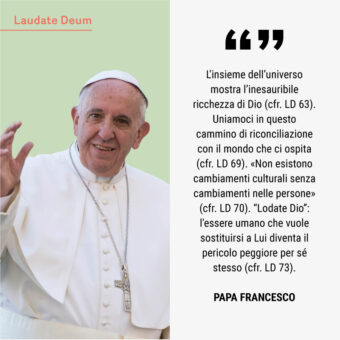Eight years after the Encyclical “Laudato Si,” the Pontiff calls again in the Apostolic Exhortation “Laudate Deum” all people of good will to respond appropriately to the climate crisis.  Still, very little has changed in the facts. The world “is crumbling and perhaps approaching a breaking point.” [2]. Last week, it was reported by the European Union’s climate observatory (Copernicus) that “September was the warmest month ever” (since 1850). Rising temperatures are certainly one of the most conspicuous symptoms of ongoing climate change. Last July, the world’s most authoritative journal in the field, “Nature,” showed that the heat waves of summer 2022 caused nearly 63,000 deaths in Europe. Certainly, we should not fall into catastrophic considerations because the margins for changing course are still possible, but we must categorically reject all irrational and unscientific negations. After decisively responding to all the most common objections against the current climate crisis, the pontiff emphasizes: “I feel compelled to make these clarifications, which may seem obvious, because of certain derogatory and unreasonable views that I find even within the Catholic Church” [14]. He distances himself from blaming the poor. “How can we forget that Africa, where more than half of the world’s poorest people live, is responsible for only a small fraction of the emissions accumulated throughout history?” [9]. Bergoglio addresses a call to each of us “to accompany this path of reconciliation with the world that hosts us and to embellish it with our own contribution” [69]. Unfortunately, some effects of the climate crisis are already irreversible: Some species have “stopped being our travelling companions and have become our victims” [15]. Yet, we cannot but “recognize […] that human life is incomprehensible and unsustainable without other creatures” [67]. All of these cannot leave us indifferent. To enable change, we need to adjust both the way we “look” at others and nature and the way we exercise power to achieve a purpose. Even small individual steps are important: they may not lead to immediate, quantifiable success, but they can act as the blueprint for cultural change and “set in motion large transformational processes that work from the depths of society.” [71]. Caring for every dimension of our planet is a collective challenge that requires a collective response. In recent years there have been many global efforts but with often disappointing results: broken promises and postponed goals. But “if we have faith in the ability of humans to transcend their small interests and think big[…], we cannot stop dreaming that COP28 will lead to a decisive acceleration of the energy transition, with effective and monitored commitments.” [54]. We also cannot give up this “dream.” It is a bet: to win all people of good will to work for a world worth living in.
Still, very little has changed in the facts. The world “is crumbling and perhaps approaching a breaking point.” [2]. Last week, it was reported by the European Union’s climate observatory (Copernicus) that “September was the warmest month ever” (since 1850). Rising temperatures are certainly one of the most conspicuous symptoms of ongoing climate change. Last July, the world’s most authoritative journal in the field, “Nature,” showed that the heat waves of summer 2022 caused nearly 63,000 deaths in Europe. Certainly, we should not fall into catastrophic considerations because the margins for changing course are still possible, but we must categorically reject all irrational and unscientific negations. After decisively responding to all the most common objections against the current climate crisis, the pontiff emphasizes: “I feel compelled to make these clarifications, which may seem obvious, because of certain derogatory and unreasonable views that I find even within the Catholic Church” [14]. He distances himself from blaming the poor. “How can we forget that Africa, where more than half of the world’s poorest people live, is responsible for only a small fraction of the emissions accumulated throughout history?” [9]. Bergoglio addresses a call to each of us “to accompany this path of reconciliation with the world that hosts us and to embellish it with our own contribution” [69]. Unfortunately, some effects of the climate crisis are already irreversible: Some species have “stopped being our travelling companions and have become our victims” [15]. Yet, we cannot but “recognize […] that human life is incomprehensible and unsustainable without other creatures” [67]. All of these cannot leave us indifferent. To enable change, we need to adjust both the way we “look” at others and nature and the way we exercise power to achieve a purpose. Even small individual steps are important: they may not lead to immediate, quantifiable success, but they can act as the blueprint for cultural change and “set in motion large transformational processes that work from the depths of society.” [71]. Caring for every dimension of our planet is a collective challenge that requires a collective response. In recent years there have been many global efforts but with often disappointing results: broken promises and postponed goals. But “if we have faith in the ability of humans to transcend their small interests and think big[…], we cannot stop dreaming that COP28 will lead to a decisive acceleration of the energy transition, with effective and monitored commitments.” [54]. We also cannot give up this “dream.” It is a bet: to win all people of good will to work for a world worth living in.
Stefania Papa
https://www.youtube.com/watch?v=Pwe_bd0TUjk




0 Comments